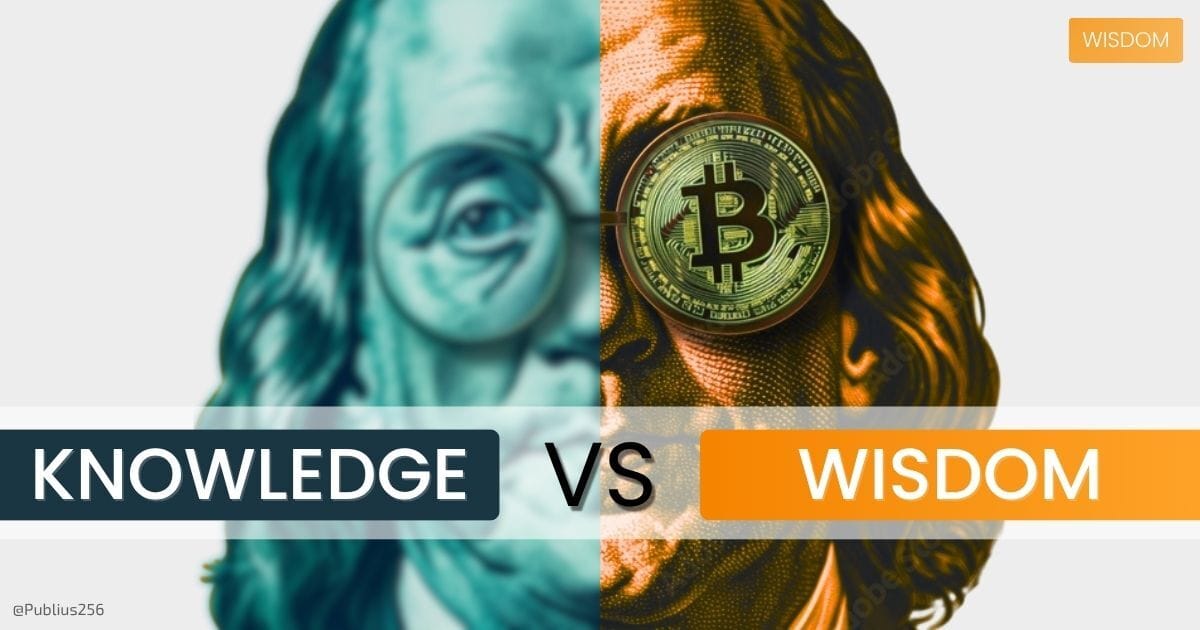- Bitcoin News Weekly
- Posts
- Knowledge vs Wisdom
Knowledge vs Wisdom
🧠 The importance of having a bias toward action

Happy Friday Bitcoiners!
This week we’re excited to launch Bitcoin Wisdom - a fun, weekly newsletter filled with useful tips and tricks on how to most effectively grow your Bitcoin wealth.
Every week, our very own @Publius256 covers topics across the fields of human psychology, stoicism, habits and more, aiming to helping you ignore the noise and quietly compound your Bitcoin capital over the long run.
In this issue, we cover:
How to Read Smarter
What is “wisdom” and how does it differ from “knowledge”?
Tips to convert knowledge into wisdom.
“Knowledge is knowing that a tomato is a fruit. Wisdom is knowing not to put it in a fruit salad”
#1 How to Read Smarter
Ever finished a fantastic book only to realize you’ve forget most of it within the first 24 hours? Don’t worry, you’re not alone - I’ve often caught myself scanning my bookshelf, earnestly searching for little scrawls or dog-eared pages that confirm whether or not I had in fact, read the book at all.
But what’s the point of absorbing knowledge from books (or listening to Bitcoin podcasts) if we merely forget all the key takeaways by the time we wake up the next day? If we wanted to increase the amount of information we retained, we could make a content summary every 10 pages, or re-read the entire book again from top to bottom.
But these strategies are a waste of time, why? Well, because books (especially non-fiction books) typically have only a few pieces of truly critical information that are worth retaining.
These are what I call ‘golden nuggets’ and they represent critical takeaways or key learnings that, if correctly implemented, have the ability to improve the readers life in some way or another.
If we accept this principle, then why on earth would we need to focus on increasing our retention rates?
There’s no need to retain more information when 90% of a book’s contents is merely superfluous information. Hate to be the bearer of bad news, but we’ve been reading wrong this whole time!
#2 Knowledge vs Wisdom
Ok, so we’ve realized the importance of reading smart, but what do we do with this newfound knowledge and how do we leverage it to become wiser?
Well, we first need to define what “wisdom” actually means.
So, what’s the first image that pops into your mind when I say the word “wisdom”?
Perhaps you’re picturing your grandmother’s sage advice, or a group of stoic Buddhist monks meditating peacefully at the peak of the Tibetan mountain plateau (they always look so content with life, don’t they?).

But what makes someone truly wise? Well, it isn’t your grandmothers ripe old age or the Buddhist monk’s virtue that symbolize their perceived stereotypical wisdom.
Rather, its their experienced hardships and life lessons they’ve accumulated over time that makes us think of them as “wise” individuals.
However, these life lessons are not something that can be learned by reading books or studying research papers. Therein lies the difference between knowledge and wisdom.
Knowledge is theoretical, whereas wisdom is practical, learned ability.
Knowledge requires relatively minor effort to obtain (almost anyone can read a book), and thus incurs very little risk of failure. Wisdom however, requires real world effort and motivation, thus offering greater rewards (wisdom gained) for those who succeed.
#3 Converting Knowledge into Wisdom
So now we know the goal - identify a few “golden nuggets” from each book and then convert these key takeaways into wisdom by taking action and putting them into practice.
Easier said than done though, as many of us are constantly distracted, run out of will power, or just simply forget (its ok, we all do it).
So lets look at a few simple ways we can focus on actually converting knowledge into wisdom:
1. Start Small
Perhaps its making your bed first thing in the morning to ensure you start the day off with an organized mind; or perhaps its completing a quick mid-day set of pushups to ensure you’re building a little more muscle, it all starts with one, small step (or pushup).
The key, however, is to start with a low effort task, helping promote consistency and instilling confidence in our actions and thus increasing the probability we convert what may have otherwise been merely a one-off action into a positive new long term habit.
2. Replace, Don’t Remove
Let’s say you’re trying to stop yourself from doom scrolling endlessly on Twitter or Instagram. You’re much more likely to fix the habit by replace your social media dopamine hit with another habit (say a coffee or a walk in the park).
Replace habits, don’t remove them altogether if you want to maximize your chances of sticking with them over the long run.
3. Create Positive Feedback Loops
The dopamine hits from clickbait social media hooks, the vast range of sounds we receive for new messages/emails - feedback loops are everywhere! They’re subconsciously influencing our behaviour often without us even recognizing.
The optimal solution then, is to use these to our advantage in order to positively manipulate ourselves into taking action. So, the next time you complete a beneficial action, ask yourself “how can I reward myself for this to increase the chances of me doing it again”.
Key Takeaway
So whether you increased your weekly Bitcoin buy limit, spent an extra hour in the sun, or even just managed to get your step goal in every day of the week, remember that wisdom is a practical ability.
Go out there and make sure to take action (you’re future self will reward you).
That’s it for this week folks.
@Publius
Enjoyed the Article?Name one thing you'd like more of 👇 |
Reply